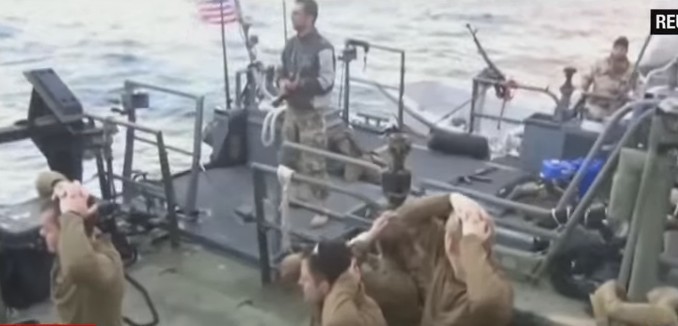The seizure of two American naval vessels and their crews earlier this week is the latest “hostile act” carried out by Iran against the United States, Lee Smith, a senior fellow at the Hudson Institute, wrote in The Weekly Standard on Friday.
Since the announcement of the nuclear deal, Iran has held regular “Death to America” rallies, sentenced Washington Post reporter Jason Rezaian to jail, arrested U.S. citizen Siamak Namazi, tested ballistic missiles in violation of United Nations Security Council resolution 1929, and allowed the Saudi Arabian embassy in Tehran to be torched, Smith wrote.
Smith observed that the detention of American military personnel fit in perfectly with this pattern, adding that photos and videos of the sailors kneeling with their hands behind their heads, which were broadcast in Iranian media, raised questions about whether the regime violated the Geneva Conventions governing the treatment of prisoners. After the sailors were released, Rep. Mike Pomeo (R – Kans.) issued a call to “fully investigate Iran for possible violations of the Geneva Convention and ensure these sailors were treated properly.”
Smith observed that there is precedent for deeming the display of captured military personnel a breach of the Geneva Conventions. When Iran broadcast images in 2007 of British sailors and marines it had captured, the government of then-Prime Minister Tony Blair called the move a violation of the conventions, stipulating that “prisoners of war must at all times be protected, particularly against acts of violence or intimidation and against insults and public curiosity.”
Students affiliated with Iran’s Islamic Revolutionary Guard Corps reportedly placed a photograph of the sailors surrendering beside the Swiss embassy in Tehran, where American interests are represented.
@MPPregent @HasanSari7 pic.twitter.com/Lndf44XTWj
— Sigizmund Tishinskiy (@doch_lebendigen) January 15, 2016
@doch_lebendigen @MPPregent @HasanSari7 In case you can't make out the text: pic.twitter.com/fQrgaHCVPH
— Jake Godin (@JakeGodin) January 15, 2016
In addition to questions about the sailors’ images, Iran may have violated international law or norms by arresting and detaining the Americans rather than just warning them to leave Iranian waters.
“Under international law, sovereign immune naval vessels are exempt from detention, boarding, or search. Their crews are not subject to detention or arrest,” Sen. John McCain (R – Ariz.), Chairman of the Senate Armed Services Committee, said in a statement on Wednesday. McCain is a former Navy officer and was a prisoner of war during the Vietnam War.
Smith concluded by challenging claims that such incidents are a result of a political conflict between Iranian moderates and hardliners, arguing that both Supreme Leader Ayatollah Ali Khamenei and the IRGC, who are conventionally described as hardliners, as well as so-called moderates such as President Hassan Rouhani and Foreign Minister Mohammad Javad Zarif, actually work together.
What is far more likely is that there is no such split between moderates and hardliners. The two camps—if there are indeed two camps—work in tandem. The hardliners take prisoners and the moderates negotiate the price of their release. Iran’s moderates are a ministry of bagmen sent out to collect on behalf of the hard men.
In short, the regime with which the White House has negotiated the future of American national security is still a regime that takes Americans hostage. Unless you believe that hijacking a U.S. Navy boat, humiliating its crew, photographing them with their hands above their heads, and broadcasting their apologies on state television is a demonstration of peaceful, moderate intentions.
Zarif, despite being widely hailed as a moderate, has a long history of uncompromising hostile statements, and the human rights situation in Iran has actually worsened significantly since Rouhani’s inauguration.
[Photo: CNN / YouTube ]




